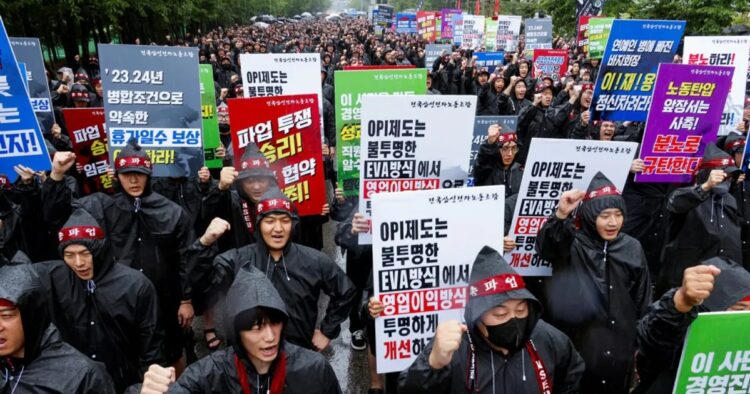Samsung Electronics, the world’s largest memory chipmaker, is grappling with challenges amid a strike by thousands of its workers. The strike, led by union officials, has seen approximately 6,500 employees participate, with efforts to garner further support ongoing.
Lee Hyun-kuk, the union’s vice president, emphasized the need for solidarity among members during a YouTube live broadcast, urging increased participation to achieve their goals. Their primary objective, Lee stated, is to halt production lines crucial for chip manufacturing.
According to reports from union officials, the strike has already caused disruptions on specific chip production lines, slowing down equipment. However, Samsung has countered these claims, asserting that production remained unaffected during the initial days of the strike.
In response to the strike, Samsung Electronics issued a statement affirming its commitment to ensuring production continuity and expressed willingness to engage in sincere negotiations with the union.
Despite the industrial action, Samsung’s stock price experienced minimal change, closing slightly up while the broader KOSPI index remained stable.
To bolster support among workers, the union plans to conduct advertising campaigns within Samsung’s chipmaking facilities, focusing on plants producing 8-inch wafers and high bandwidth memory (HBM) chips, crucial components for AI processors.
Union officials have disputed media reports suggesting low participation rates, attributing this to insufficient time for educating members about the labor issues at hand. Training sessions were conducted recently to inform and rally support among workers.
In an effort to strengthen their position, the union has revised its demands, which now include a 3.5% increase in base salary and the introduction of a special day off to commemorate the union’s founding. Previous negotiations from management offered a 3% salary increase, falling short of the union’s expectations amidst rising inflation concerns.
Analysts have pointed out the difficulty in assessing the strike’s impact on Samsung’s production output without specific details provided by the union regarding affected processes and quantities of wafers.
Lee Kyungmook, a business professor at Seoul National University, highlighted challenges facing the union, suggesting that widespread worker support might be hindered by potential financial repercussions from disrupted production, impacting bonuses tied to company profitability.
The strike comes amidst recent labor negotiations in South Korea, where Hyundai Motor and its union reached a tentative wage deal, potentially averting a strike at the auto giant. Comparisons between different sectors underscore varying dynamics in labor relations across South Korea’s industrial landscape.

















Comments